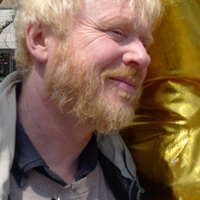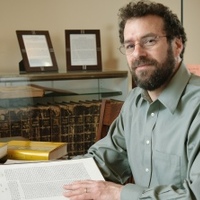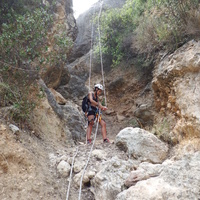
Andrew McGowan
Dean of the Berkeley Divinity School at Yale, and McFaddin Professor of Anglican Studies at Yale Divinity School.My academic work focuses on ancient Christianity, with particular interests in the 2nd-3rd centuries, in early liturgical practice (and related issues of food and meals) and on aspects of contemporary Anglicanism and its liturgy. I have been involved in collaborative research with the Society of Biblical Literature's 'Meals in the Greco-Roman World' Group, and earlier with the American Academy of Religion's 'Practice of Christianity in Roman Africa' Seminar.I also write and blog on contemporary Anglicanism, Liturgy, and higher education. I was formerly editor of the Journal of Anglican Studies.
less
Related Authors
Phillip Tovey
Durham University
Benoit Vermander
Fudan University
Robert Nelson
University of Melbourne
Joel Hecker
RRC
Yury P . Avvakumov
University of Notre Dame
Stefan Fischer
University of Vienna
Jonathan Brumberg-Kraus
Wheaton College, MA
vikas kumar
CCS University, Meerut
Alazne Talotti
Universidad Autónoma de Madrid
InterestsView All (33)










Uploads
Books by Andrew McGowan
The contributors are Gary Anderson, David Aune, James Charlesworth, Adela Yarbro Collins, John Collins, James Elliot, Eldon Jay Epp, Philip Esler, Craig Evans, Everett Ferguson, Sean Freyne, Gabriela Gelardini, Mark Goodacre, Rowan Greer, Richard Horsley, Judith Lieu, Francisco Lozada, Edgar McKnight, Elaine Pagels, Pheme Perkins, Richard Pervo, David Rhoads, James Robinson, David Runia, Thomas Stegman, Thomas Tobin, Joseph Tyson, and James C. VanderKam.
Eucharistic meals involving cheese, milk, salt, oil, and vegetables are attested, and some have argued that even fish was used. The most significant exception to using bread and wine, however, was a 'bread-and-water' Christian meal, an ancient ascetic form of the Eucharist.
This tradition also involved rejection of meat from general diet, and reflected the concern of dissident communities to avoid the cuisine - meat and wine - characteristic of pagan sacrifice. This study describes and discusses these practices fully for the first time, and provides important new insights into the liturgical and social history of early Christianity.
Papers by Andrew McGowan
The contributors are Gary Anderson, David Aune, James Charlesworth, Adela Yarbro Collins, John Collins, James Elliot, Eldon Jay Epp, Philip Esler, Craig Evans, Everett Ferguson, Sean Freyne, Gabriela Gelardini, Mark Goodacre, Rowan Greer, Richard Horsley, Judith Lieu, Francisco Lozada, Edgar McKnight, Elaine Pagels, Pheme Perkins, Richard Pervo, David Rhoads, James Robinson, David Runia, Thomas Stegman, Thomas Tobin, Joseph Tyson, and James C. VanderKam.
Eucharistic meals involving cheese, milk, salt, oil, and vegetables are attested, and some have argued that even fish was used. The most significant exception to using bread and wine, however, was a 'bread-and-water' Christian meal, an ancient ascetic form of the Eucharist.
This tradition also involved rejection of meat from general diet, and reflected the concern of dissident communities to avoid the cuisine - meat and wine - characteristic of pagan sacrifice. This study describes and discusses these practices fully for the first time, and provides important new insights into the liturgical and social history of early Christianity.